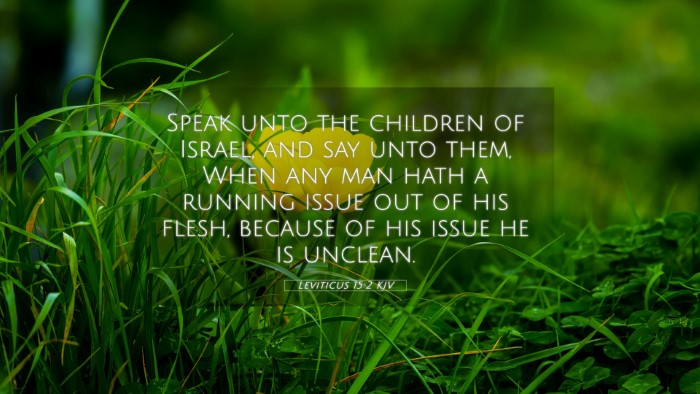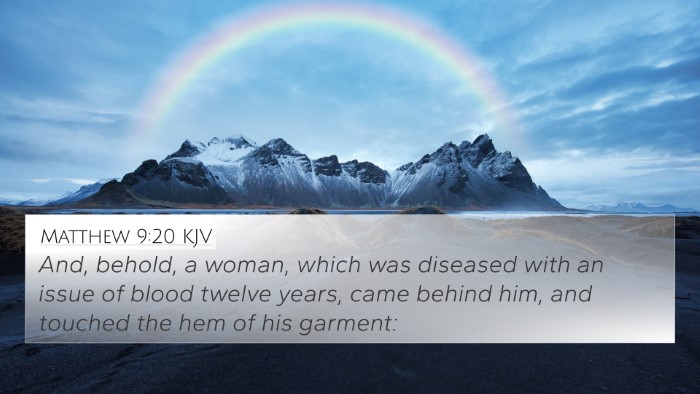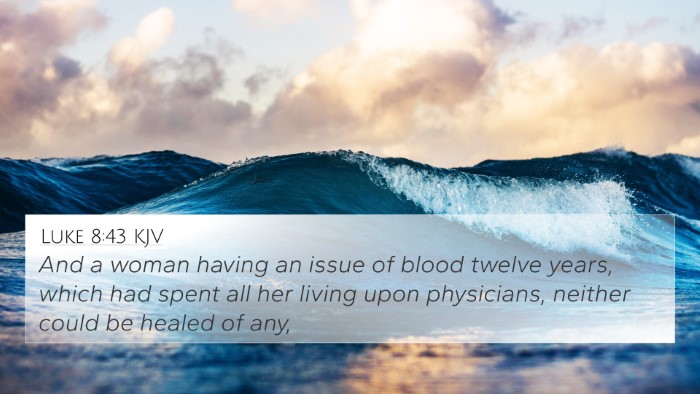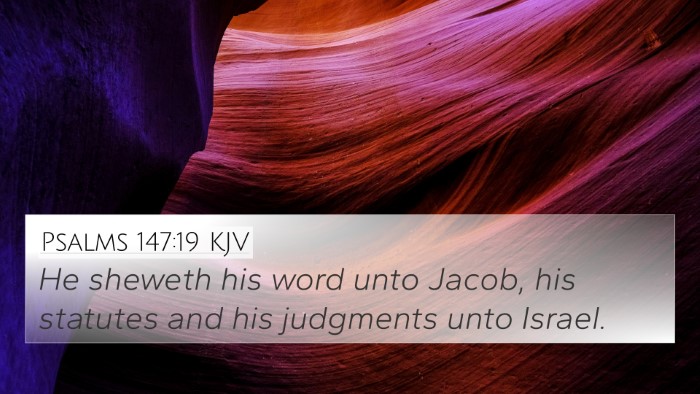Understanding Leviticus 15:2
Leviticus 15:2 states: "Speak unto the children of Israel, and say unto them, When any man hath a running issue out of his flesh, because of his issue he is unclean." This verse introduces the laws concerning bodily discharges, emphasizing the concept of ritual cleanliness and the implications of various bodily issues as they relate to communal and religious life.
Commentary Insights
This verse has rich implications and significations explored deeply in public domain commentaries.
Matthew Henry's Commentary
According to Matthew Henry, this verse begins a discussion on issues of cleanliness which affect a man's ability to participate in worship. Henry notes that such laws were not only about physical cleanliness but also about maintaining purity in God's presence. The running issue symbolizes not only physical ailments but can also reflect spiritual uncleanness, making a connection to one's overall state before God.
Albert Barnes' Notes
Albert Barnes explains that the “running issue” likely refers not only to a physical condition, but it symbolizes one’s state of being that calls for divine purification. He highlights the importance of community health, suggesting that an unclean individual might disrupt the ritual purity of the community and stresses the need for regulations that maintain purity among the Israelites.
Adam Clarke's Commentary
Adam Clarke adds details regarding the severity of the unclean state and what it implies for societal interaction. Clarke interprets this issue as both a physical ailment and a practical concern for any individual’s interactions. His commentary points out the importance of adhering to God’s instructions to ensure both personal and community holiness.
Theological Implications
The laws stated in Leviticus are grounded in a desire for purity that extends beyond mere physical health into spiritual wellness. The communal aspect of these laws invites deeper reflection on how one's individual health and purity affects the broader community. It resonates with New Testament ideas of internal purity and the nature of community within the Church.
Cross-References to Leviticus 15:2
- Leviticus 11:44-45 - Calls for holiness and cleanliness among God’s people.
- Numbers 19:20 - Discusses the consequences of remaining unclean.
- Ezekiel 36:25 - Prophetic promise of spiritual cleansing.
- Matthew 9:20-22 - The healing of a woman with an issue of blood signifies the link between physical and spiritual healing.
- Mark 1:40-42 - Jesus cleanses a leper, showing His ability to overcome uncleanness.
- Acts 10:15 - God declares things clean, emphasizing the shift in understanding of purity.
- 1 Peter 1:15-16 - The call to holiness reflects the desire for believers to live pure lives.
Connections Between Bible Verses
This exploration of Leviticus 15:2 opens avenues for understanding significant themes such as:
- The Theme of Cleanliness: This is foundational in both Old and New Testament contexts.
- Spiritual Purity: Linking with ideas presented in New Testament teachings.
- The Impact of Sin: How physical ailments and spiritual conditions are interconnected.
Practical Applications
Understanding the implications of Leviticus 15:2 encourages believers to examine their lives for areas needing spiritual reflection and cleansing. It challenges the community to maintain unity and holiness in their collective worship practices.
SEO Keywords
This exploration relates highly to the following keywords and phrases:
- Bible verse cross-references
- Connections between Bible verses
- Linking Bible scriptures
- Bible verses that relate to each other
- Inter-Biblical dialogue
- How to find cross-references in the Bible
- Identifying connections between Old and New Testament
Conclusion
Leviticus 15:2 serves as more than just a rule about cleanliness; it initiates a profound understanding of how personal purity affects communal worship and spiritual conditions before God. Through the lens of cross-references and the insights from noted commentaries, readers are invited to reflect on their spiritual states and encourage a community striving for holiness.














